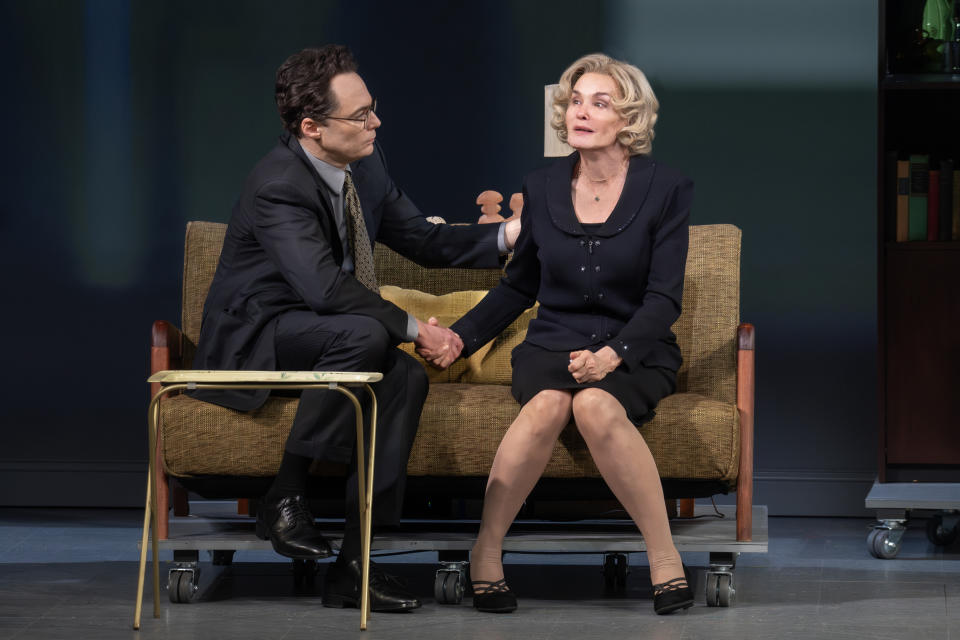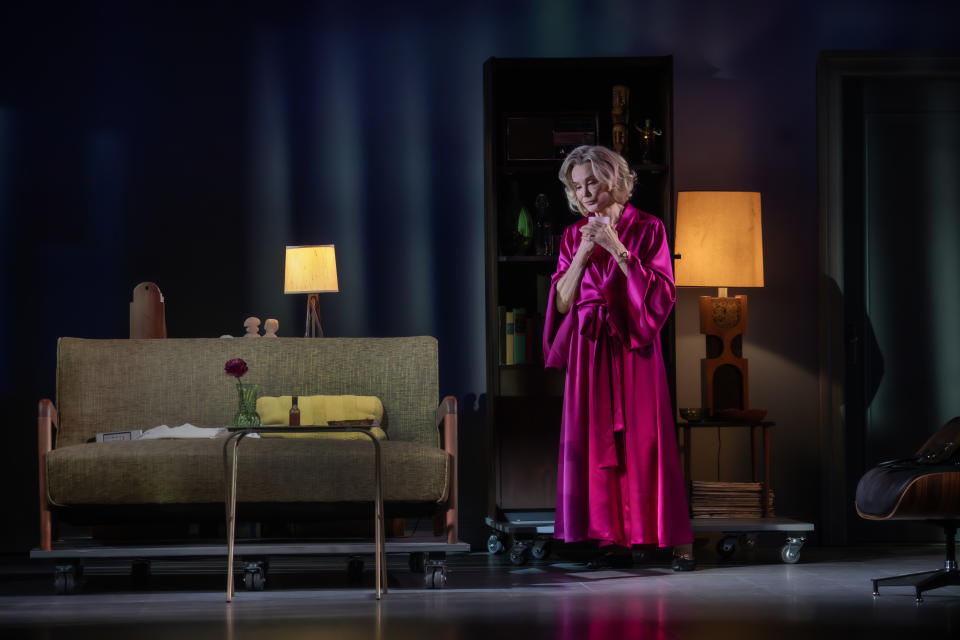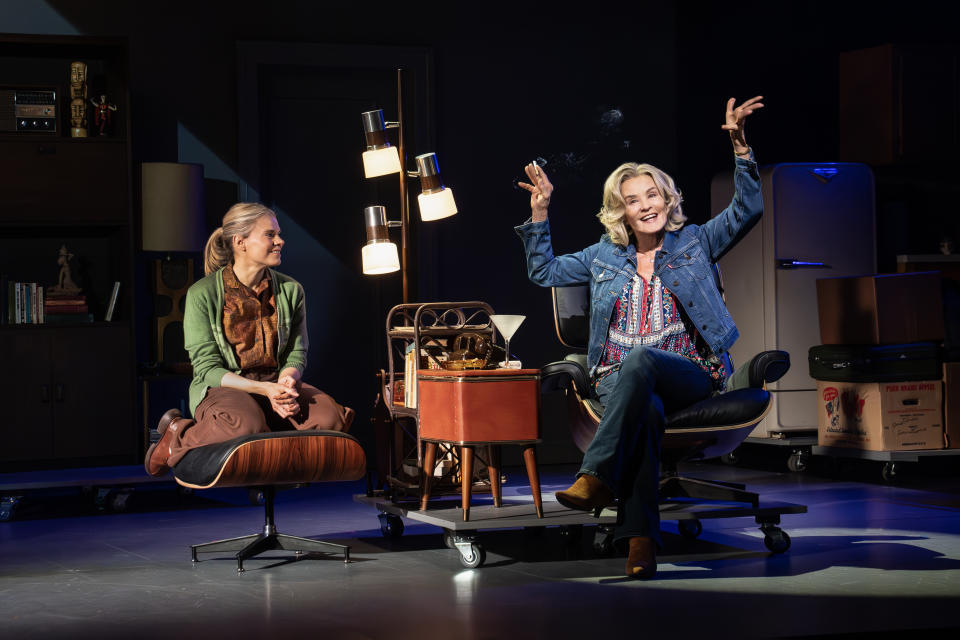Jessica Lange Talks ‘Mother Play’, Bad Moms & How To Mesmerize An Audience With 12 Minutes Of Silence – Deadline Q&A

Towards the end of Paula Vogel’s hit Broadway drama Mother Play, all dialogue comes to a halt for 12 long, mesmerizing minutes, and Jessica Lange is on stage, alone, for every second of them. Her character Phyllis – the mother of the title, based on the mother of the playwright – has alienated her two adult children, Martha (Celia Keenan-Bolger) and Carl (Jim Parsons), after a lifetime of pretty odious behavior, most damningly her abandonment of the son she seemingly loved as he’s dying of AIDS. Set in the 1960s, ’70s and ’80s, Mother Play, directed by Tina Landau, is based on Vogel’s real-life family events, including the death of her beloved brother, and knowing the source only makes the tragedy onstage more affecting.
Somehow, though, Mother Play, with its moments of grace scattered here and there and rarely where you expect them, feels infused with a hard-won humanity for each and every corner of this familial triangle, never more so than when those 12 minutes of loneliness tick by as Phyllis attempts to busy herself in the silent apartment once filled with the sounds, some happy, many sad, even more angry, of family.
More from Deadline
The Making Of ‘Illinoise’ And The Guiding Vision Of Sufjan Stevens – Tony Watch Q&A With Justin Peck
Audra McDonald Takes Rose's Turn In Broadway 'Gypsy' Revival
Lange’s performance – not least those 12 minutes – has earned her a Tony Award nomination for Best Leading Actress in a Play (she previously won the award in 2016 for playing Mary Tyrone in Long Day’s Journey Into Night, capping what might be seen as her triumvirate of classic American female roles that began in 1992 with Blanche DuBois in A Streetcar Named Desire and continued with Amanda Wingfield in 2005’s The Glass Menagerie).
Her 2024 nomination is one of four for Mother Play, including Best Play, Best Featured Actress/Play (Bolger) and Best Featured Actor/Play (Parsons).
In this candid conversation, Lange, whose starring role in the Broadway-themed HBO film The Great Lillian Hall is drawing rave reviews, discusses the new play, the character and some other very bad mothers she’s portrayed so memorably.
This interview was condensed and edited for length and clarity.
Mother Play is playing at Broadway’s Hayes Theatre through June 16
DEADLINE: Let’s start with how you came to Mother Play.
JESSICA LANGE: Well, it was a kind of long, roundabout way, actually. Several years ago I went to see something at the Hayes Theater. I mean, I’ve seen things there before, but I was really struck that time with the intimacy, and just the feeling inside the theater, and I said to my friend that I was with, I would love to work in this theater sometime, and he then put me in touch with Carole Rothman who runs Second Stage. We had coffee one day and I just again mentioned to her I would love to work in the theater sometime.
A couple years later I got a call just saying would I be interested in doing a new play, and I thought, well, that’s one thing I’ve never done, a brand-new play, trying it out for the first time, creating the character. It’s always been, you know, one of the classics, whether it’s Long Day’s Journey Into Night or Streetcar Named Desire. So, this I thought, yes, I could do this.
And then the play was sent to me and I read it and I thought, oh, it seems like a good fit for me. I’d like to work on this.
DEADLINE: What was it about Phyllis, the character that you play, that made you think she’d be a good fit? She’s a tough cookie.
LANGE: She’s tough, and I think it’s hard for the audience, I would imagine. There are certain moments in it that just are so abrasive and really kind of terrible when you think about it, but you know, it was such a huge emotional ride from beginning to end, which is what always appeals to me in a character. A raw nerve basically.
But there were many things about it that appealed to me. The idea of doing a character over a 40-year period without the use of prosthetics, makeup. The only things you have to draw on are your body, your voice, your energy level, things like that, and that presented a really wonderful challenge. And I love being on stage with Jim and Celia.
DEADLINE: The three of you feel like a family. A dysfunctional family, but a family.
LANGE: You never know going into something whether that chemistry is going to be there. That’s the mystery. It’s a certain kind of alchemy in a way, you know?
DEADLINE: For people who haven’t seen the play, Phyllis is a mother who has, to put it mildly, a very rocky relationship with her two children, particularly with her daughter but also her son as time goes on. You’ve played some other tough mothers recently. You were Nina Capote [on Feud: Capote Vs. The Swans], you were Joan Crawford [on Feud: Bette And Joan], although you didn’t really get into the Mommie Dearest aspect of Joan’s life…
LANGE: No, we didn’t. That piece we didn’t deal really with the daughter at all.
DEADLINE: And I think on one of the American Horror Stories you gave birth to the Antichrist.
LANGE: [Laughs] I did? I can’t remember. [Editor’s Note: She didn’t. Her character, Constance Langdon, was the grandmother of the Antichrist-ish Michael Langdon in American Horror Story: Apocalypse.]
DEADLINE: Maybe you just helped raise him, but there was a demon in there somewhere. Where does Phyllis fit in to this roster of mothers? Is she forgivable? I don’t think Capote’s mother was.
LANGE: I would say she made unforgivable decisions, unforgivable mistakes in her life. But I think she also realizes that and I believe she pays the price in her later years. That whole sequence of her alone in the evening, you see what her decisions have wrought, really, after she’s turned away her children for reasons that to me are beyond understanding. I mean, we also have to look at the time, look at where she came from, what was acceptable, not acceptable. I’m always struck by how many people of an older generation come up to me and say That was the same thing that happened when I came out to my parents.

DEADLINE: I think people who weren’t around when AIDS first hit probably can’t understand how many parents rejected their sons who got sick. It was not an uncommon thing.
LANGE: No, it wasn’t, nor was it uncommon that they shut their child out when they came out to them, you know? Thank God we’ve moved to somewhere beyond that.
DEADLINE: You mentioned the scene where we see that she’s paying for her mistakes, her actions. Again, for people who haven’t seen it, it’s, what, seven minutes of no dialogue, just you alone and…
LANGE: I believe it’s 12 minutes.
DEADLINE: You’d know better than anyone. You’re alone in that apartment, sort of puttering around at some points, and at other points staying very still. It’s one of the most effective depictions of loneliness I’ve ever seen on a stage. I’m wondering how you approach that scene each night. Does it change? Is there a set routine? Do you improvise at all?
LANGE: It wasn’t exactly written out but in rehearsal we determined kind of sign posts, you know? A lot of it is motivated by the passing the time until this kind of self-imposed hour when she allows herself to have her first drink and then when she can have her second drink. So, it’s filling up that time. We found things like trying to watch TV, about to play Solitaire, heating up dinner, any number of things. But then within that it’s been kind of left up to me.
What was really interesting about it to me was how to find the movement that somehow expresses that aloneness, that loneliness. And it changes every night in that the emotional content keeps shifting. Whatever it is that’s crossing through my mind informs the posture and the movement and the stillness. or whatever.

DEADLINE: Do you notice a difference in audience reactions each night?
LANGE: What I’ve been amazed at is how still the audience is. At first I thought, I don’t know if we’re going to be able to pull this off. Twelve minutes, that’s a long sequence of just staring off into space. I kept thinking, Is this going to work? Is the audience going to yell? Will I get the hook? But I’m going to knock on wood right now because they’ve stayed with it. They’ve really stayed with it.
DEADLINE: That’s you holding the audience. I’m wondering, which of three scenes – the silent scene, the five martini drunk scene, or scene where you dance with your kids in a disco – is, as an actor, the most fun to do?
LANGE: The five martini scene ends up in an absolute ,like, state of rage and breaking down weeping, so, that’s not exactly fun. The lonely scene, those 12 minutes, I mean, it’s fascinating to do but I wouldn’t say that’s a laugh riot to play either. But I love the disco scene. It’s one of those moments where you can just kind of like, ahh, I’m dancing, this is great. If you were asking me just really strictly what is the most fun? I’d have to say the disco.
DEADLINE: One of the things I found unusual about this play is it’s the focus on the mother-daughter relationship. Even in The Glass Menagerie, it’s the mother worrying about her daughter and her daughter’s future. I don’t know that Phyllis much cares about her daughter’s happiness one way or the other.
LANGE: You know, I’ve never understood this. I’ve never experienced this. I know a lot of women talk about the fraught relationships they had with their mothers. I was graced with the loveliest, most generous, kindest mother you could imagine so I don’t understand where that trouble comes in. But I don’t think that’s uncommon.
This play takes it much further, of course, and we get into this thing of Phyllis not accepting her daughter for being gay. From the very beginning Phyllis has a very easy physical relationship with her son. They’re always kind of touching one another, but she does not have that with her daughter. The play doesn’t really explain where that came from or why. I talked to Paula about it, but ultimately you can only play what’s written and what’s on the page, and there is something that’s not entirely transparent about why she feels that way about her daughter. Sometimes you just can’t explain familial dynamics. They’re a great mystery.

DEADLINE: My sense is that on some level Phyllis senses that her daughter is not going to be the girlie-girl that maybe she had in mind, you know? There what used to be called tomboyishness about her, and even Phyllis probably can’t quite put her finger on it but she knows something’s slightly off.
LANGE: Yeah, and I also think, as Paula mentions once or twice in the play, that much of her daughter reminds her of her daughter’s father. And there’s a terrible rage of towards the ex-husband.
DEADLINE: Did Paula give you tips in terms of this is how her mother would have said something, how she would have…
LANGE: No. No. Thank goodness. She was very generous in just letting me kind of run with it. But also I think the play is so specific and so well written that unless I had gotten way off track then maybe she would have felt compelled to say something, but no. There was none of that. It’s different when you’re doing a biography or you’re playing a historical character, and then I’ve done a few of those…
DEADLINE: Patsy Cline…
LANGE: Patsy Cline, Frances Farmer, Joan Crawford, Edith Beale. You know, there you do as much research as you possibly can because you want to be as true to the character, and that character is recognizable, well known. It was a different process with this, much more interpretive.
DEADLINE: You sound excited to be back on Broadway. Is there anything you don’t like about it?
LANGE: It’s hard work. I’m much older now, and it’s exhausting for me. It’s funny because when they talked to me about this play and I said, Oh, it’s a very small, contained 90-minute, or hour and 45 minute, play. That’s going to be easy compared to doing Long Day’s Journey Into Night which stretches almost four hours. I thought, oh, yeah, I can do that easy. What I didn’t anticipate was the velocity of emotions in it that is absolutely exhausting. And the pace at which the play moves. We’re hardly ever off stage. It’s like, it doesn’t stop for a moment. You can’t really go off stage and just kind of sit down for a minute and catch your breath. The pace is relentless.
DEADLINE: You won a Tony for Long Day’s Journey (2016), you’ve won many other awards. Is there still an excitement around being nominated?
LANGE: Oh, it was thrilling that morning when I turned my phone on and saw the text. It’s thrilling to be recognized by this community, and the best part of the whole day was that all three of us were recognized. That was the best of the best of the best.
.
Best of Deadline
'Knives Out 3': Everything We Know About The Second Rian Johnson Sequel
Hollywood & Media Deaths In 2024: Photo Gallery & Obituaries
2024 Premiere Dates For New & Returning Series On Broadcast, Cable & Streaming
Sign up for Deadline's Newsletter. For the latest news, follow us on Facebook, Twitter, and Instagram.

 Yahoo News
Yahoo News 
